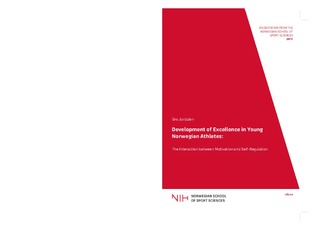Development of excellence in young Norwegian athletes: the interaction between motivation and self-regulation
Doctoral thesis
Permanent lenke
http://hdl.handle.net/11250/2453000Utgivelsesdato
2017Metadata
Vis full innførselSamlinger
Sammendrag
Introduction: Motivational and cognitive processes are interrelated and greatly influence one another (e.g., see Baumeister & Vohs, 2007; Inzlicht, Schmeichel, & Macrae, 2014). Investigating the interactive nature of these constructs will increase our understanding of human behavior (Baumeister, 2016). Guided by the self-determination theory of motivation (Deci & Ryan, 1985, 2000; Ryan & Deci, 2000), as well as the social cognitive (Zimmerman, 1989; Zimmerman & Campillo, 2003) and self-control (Baumeister, Vohs, & Tice, 2007) models of self-regulation, the current doctoral thesis aimed to investigate the interaction between motivation and self-regulation in young high-level winter sport athletes. Some have argued that elite-level athletes are likely to be driven by a complex amalgam of motivational regulations (Gillet, Berjot, Vallerand, Amoura, & Rosnet, 2012). However, in the long-term development to reach elite-level performance and become World or Olympic Champion, the more self-determined types of motivation are believed to promote higher cognitive capacity and lead to more positive sport participation outcomes (Briki, 2016). Aim: The aim of the current thesis was to explore the respective role and the interplay between different types of motivation regulations and self-regulation competencies in the development of elite level performance. In a series of papers, we investigated how different types of motivation interact with self-control in predicting exhaustion within proximal and distal timeframes. In addition, we examined the temporal ordering of motivation and selfcontrol to gain insight about the interaction pattern between these two intertwined constructs. Up until now, competing self-control depletion models had proposed opposing orderings of these two constructs (e.g., Baumeister et al., 2007; Inzlicht & Schmeichel, 2012). Paper I: Tatt ut av filen i Brage p.g.a. copyright-restriksjoner. / Not in the file in Brage because of copyright issues. Paper II: Jordalen, G., Lemyre, P.-N., & Durand-Bush, N. (2016). Exhaustion experiences in junior athletes: The importance of motivation and self-control competencies. Frontiers in Psychology, 7(1867). doi: 10.3389/fpsyg.2016.01867 Paper III: Tatt ut av filen i Brage p.g.a. copyright-restriksjoner. / Not in the file in Brage because of copyright issues. Paper IV: Tatt ut av filen i Brage p.g.a. copyright-restriksjoner. / Not in the file in Brage because of copyright issues.
Beskrivelse
Avhandling (doktorgrad) - Norges idrettshøgskole, 2017
